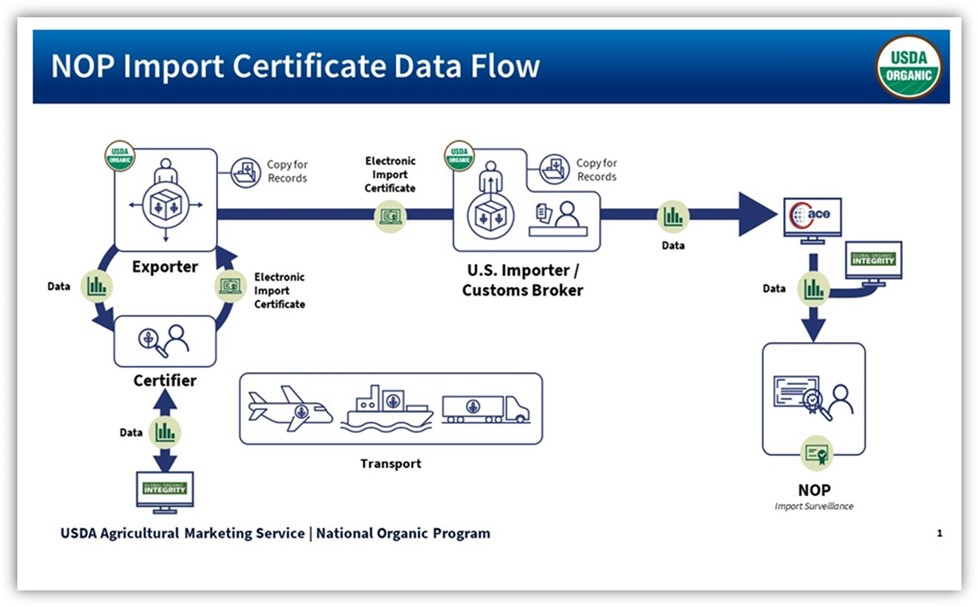The USDA National Organic Program’s Strengthening Organic Enforcement (SOE) Rule requires all organic imports into the United States to be declared as organic and associated with an NOP Import Certificate. This change will improve traceability and oversight of organic imports into the United States. An NOP Import Certificate is a transaction certificate that contains detailed information about the quantity and origin of the organic product being imported into the United States. Currently, this document is only required for shipments from countries where the USDA has established an equivalence arrangement. Starting March 19, 2024, this document will be required for all organic imports, including those certified to the NOP organic standard.
Under the SOE regulation, exporters and importers must be certified organic.
NOP Import Certificate Process:
- The exporter in the foreign country will request the NOP Import Certificate from their certifier.
- The certifier will review the request and issue the NOP Import Certificate in the USDA Organic Integrity Database.
- The certifier will provide the NOP Import Certificate to the exporter, who will then provide the certificate information to the U.S. importer.
- Each NOP Import Certificate will have a unique identification number. As a part of its standard filing process, the U.S. importer or customs broker enters the NOP Import Certificate number into the CBP ACE system (U.S. Customs and Border Patrol Automated Commercial Environment). This will associate the shipment details in ACE with the import certificate information. The NOP Import Certificate does not have to physically accompany the shipment, as long as the data is associated with the shipment in ACE. This process is governed by timelines determined by CBP. The NOP Import Certificate should be available for review at the importer’s organic inspection.
Responsibilities for the U.S. Importer
- Request a copy of the NOP Import Certificate from your exporter.
- Ensure that the import is accompanied by accurate NOP Import Certificate data.
- Ensure products are identified as organic on all import documents, including but not limited to invoices, packing lists, bills of lading, and U.S. Customs and Border Protection entry data.
- Maintain import documents on site and make them available for inspection.
- Verify that the shipment has had no contact with prohibited substances or exposure to ionizing radiation since export. The organic importer must have a documented organic control system to conduct this verification. To document your organic control system, complete the updated H5.0 Organic Record Keeping for Handlers form or write your own procedure. This will be verified at your next inspection.
Transaction vs. Time Frame:
The certifier may issue the NOP Import Certificate for a single transaction, or in certain cases may issue an NOP Import Certificate for a specific time frame. If issued for a time frame, the NOP Import Certificate would cover a certain amount of product shipped over that time period. A separate certificate is required for each exporter/importer relationship for each product and HTS code. Time frame certificates can alleviate the administrative burden for operations with a high frequency of shipments, especially for fresh produce coming overland from Canada or Mexico.
Do you export to the United States from Canada or Mexico?
- Complete this short questionnaire: https://forms.microsoft.com/r/sRhBUG9h6a.
- If you are certified with CCOF, request your NOP Import Certificates by completing the request packet and sending to export@ccof.org: CCOF NOP Import Certificate Request Packet.
Resources:
For more information and updates from the USDA, visit their Electronic Organic Import Certificate website and review the Strengthening Organic Enforcement Final Rule Primers.
For more information from CCOF, visit our SOE – Key Takeaways for Importers and Exporters website.
For questions, contact export@ccof.org.
